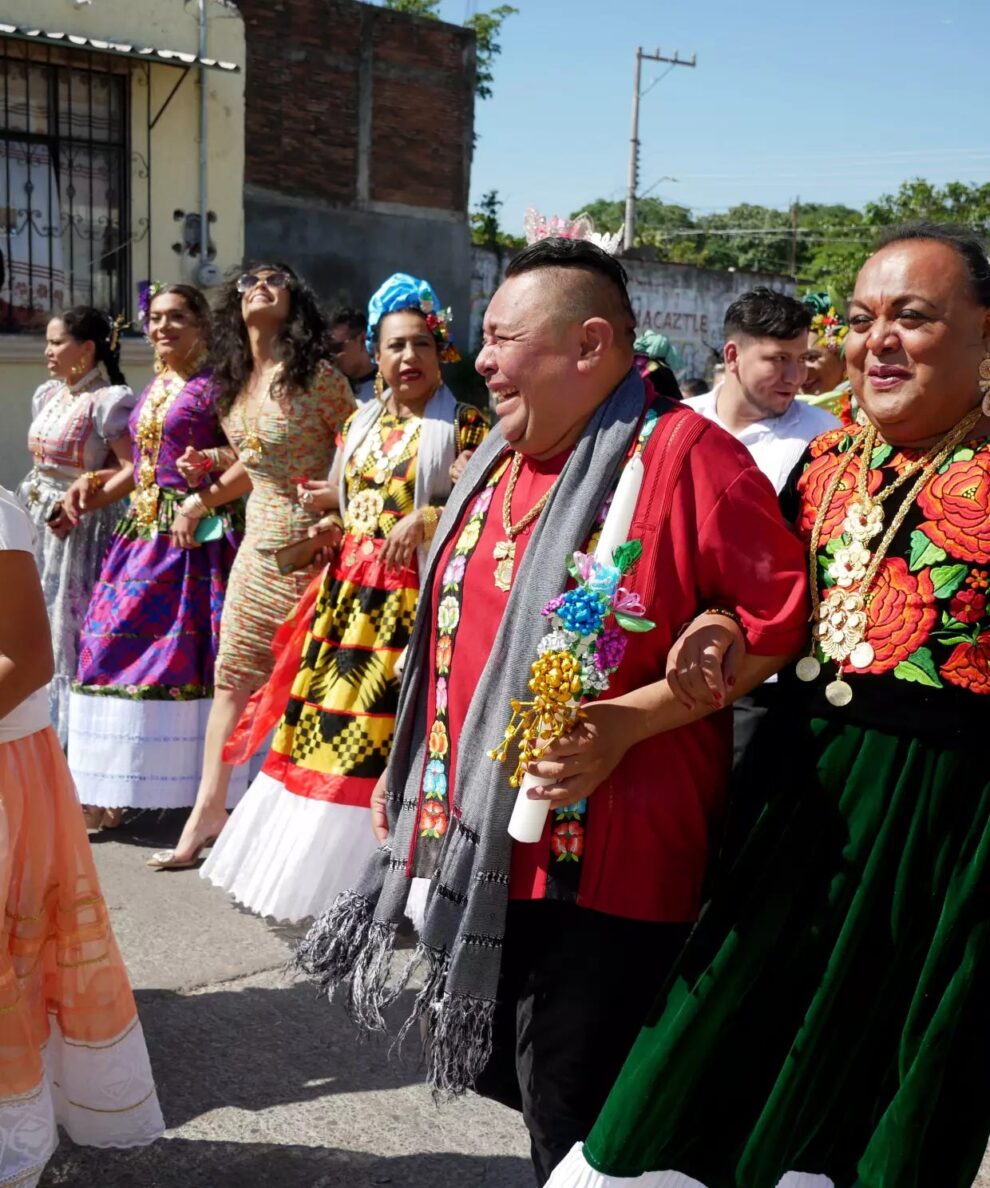In southern Mexico, muxes are a group that have been long recognized within the indigenous Zapotec people and who are often referred to as a third gender. Within Zapotec cultures in the region, muxes are individuals assigned male at birth who embrace gay and feminine identity.
In the Zapotec language, there is no gender. We have always existed and we have always resisted. – Felina Santiago, matriarch of Juchitan, Oaxaca’s muxe community
During the weekend of November 17, thousands of muxes and other members of the LGBTQ community attended the 48th annual celebration of Mexico’s third gender, a music festival in Juchitan, Oaxaca where sexual and gender diversity were celebrated, and the need to fight for LGBTQ people’s rights amid recent losses were highlighted. The streets were filled with dancing and music, and a pageant that featured muxes in traditional dress. A special mass was also held for festival attendees and other members of the local community before the festivities began.
The name of the festival was the “True Fearless Seekers of Danger” vela, a name which spoke to the risk that many of the community members face. This vela was founded over 40 years ago by Oscar Cazorla, who was killed at home in 2019. It also took place less than a week after Ociel Baena, Mexico’s first openly nonbinary magistrate and prominent LGBTQ activist, was found dead at home. Both deaths were a reminder of the need to continue to fight to make Mexico a safer place for gender-diverse people.
Our fight will end the day we have equality, the day there is respect for the community and, above all, the day when going out to fight is a privilege and not a necessity. – Elvis Guerrero, participant in the muxe pageant
To combat the discrimination and exclusion faced in society, a group of Orang Asli women have created documentaries and workshops to strengthen their representation within society. Their first project was an anthology of women and girls’ narratives from Orang Asli communities on their educational journeys, obstacles they have overcome, and hopes for the future. After writing, they moved on to producing short films, and, to date, they have completed three films that expose the growing marginalization of the Orang Asli on their own land: “Selai Kayu Yek” (Roots of My Land), “Klinik Ku Hutan” (The Forest, My Clinic), and “Rahsia Rimba” (Secrets of the Forest Guardian). This loss of the Orang Asli ancestral land has especially affected women, whose traditional livelihoods have been lost due to the lack of available resources.
The group has also created a YouTube channel to further raise awareness, amongst the general public, about the existence of these Indigenous communities, their identities, and the issues they face by highlighting the traditions, cultures, and lives of individuals within Orang Asli communities.
I hope that all Orang Asli, regardless of age, will start actively using media. Even if it is an ordinary day, just record it (on video) and post to social media so that more people outside of the communities will be aware of the identity and culture of Orang Asli in Malaysia. We will be waiting for a long time for the authorities to finally recognize our issues, such as land rights, if we do not act now. The change I want to see is for us to be able to claim our rights, equal to other races. – Eliana, a 22-year-old Jakun woman from Kuala Rompin, Pahang
Many of the women have admitted that getting support and blessings from their family was one of the most challenging obstacles when this project began, as men are still seen to be of a higher status within their community
My life has been full of pain. In my community, women have less power, but if you are disabled, you are even more vulnerable to exploitation. – Angela Muhindo
After her parents died, a dispute arose over the inheritance of their property. In Uganda, land disputes can sometimes be a catalyst for gender-based violence, where widows and children are often evicted from their homes after the “man” of the family passes away. This does not just apply to individuals living in homes, women and children can also be evicted from their land and farms.
Muhindo says she was threatened and intimidated by her male relatives over the inheritance, and said she felt powerless to advocate for herself. In order to better understand her rights, she began attending a training course which was implemented by the National Union of Women with Disabilities Uganda through UN Women. From this training course, she learned about her inheritance rights and understood that she was the sole legal heir to the property.
After she gained the courage to stand up to her family, it took over a year, but Muhindo was able to successfully put her family’s land in her name. She now has her home back and has a sustainable source of income, earning a living from the crops she grows. Muhindo also advocates for other women in her community, including individuals living with disabilities. She also speaks about gender-based violence on a local radio station.
I realized that as a person living with disabilities, I can do whatever other people can do. I can speak up just like any other person. I can buy land, have a job…I do not want other women to go through what I went through. – Angela Muhindo
Japanese laws state that individuals can only obtain a morning-after pill at a clinic or pharmacy with a doctor’s prescription; this includes survivors of sexual assault. However, the tide is shifting in the country. Japan has just implemented a pilot project which will allow for the sale of morning-after pills without a prescription. The pill is set to be available at 145 pharmacies.
After a public consultation, Japan’s health ministry found overwhelming support to make the pill over the counter. In 2017, selling the drug without a prescription was first discussed by a health ministry panel, but officials did not give the go-ahead, stating that it would lead to more irresponsible use of the drug. Now, the health ministry has found overwhelming support – 97 percent of respondents in favour.
The 145 pharmacies that will begin selling the morning-after pill will only cover around 0.2 percent of the 60,000 pharmacies across Japan. Depending on the results of the trial, the Japanese government could approve a full-scale rollout of the pill.
Individuals rely on the morning-after pill for a number of reasons, which is why the announcement has gained some praise, however the majority of responses have called out the health ministry. Rights groups have criticized the trial, saying that it is too small and for restrictions to be lifted. The Emergency Contraceptives at Pharmacies Project, a campaign group, has also urged the health ministry to make the pill fully and rapidly available in all drug stores without restrictions.
Globally, emergency contraceptives are available without a prescription at pharmacies in around 90 countries. The World Health Organization calls for emergency contraception pills to be routinely included within all national family planning programmes.
In the Karakoram mountains of northeast Pakistan, generations of Wakhi shepherdesses have led their sheep, goats, and yaks up the mountainside. This journey used to take three to five days, however it is a treacherous one to make to the lush green pastures and glacial water which sit in Pamir, almost 5000 metres above sea level. Threats of avalanches and wild animals such as wolves and leopards, as well as a lack of healthcare professionals on the journey has resulted in a number of deaths and injuries over the years, but this has not stopped the shepherdesses from doing what they know best.
We used to wear simple robes. We would be shoeless, and walk into the ice like that…We’ve walked these lands alongside our mothers and grandmothers. Like us, they were shepherdesses, churning butter, and making yogurt. – Annar, Wakhi shepherdess
The Wakhi shepherdesses became successful businesswomen over the years, collecting milk from the animals to make yogurt and dairy products, and shearing the sheep to make items for the village. At the same time, men in the community were farming and supporting the local economy as well. The Wakhi community relied heavily on barter in the past, and the trading of their goods allowed for the building of huts and houses for the shepherdesses. One of the women, Afroze, earned enough to build homes in Shimshal and Gilgit.
The combination of the women’s shepherding and the men’s farming led to tremendous economic growth for the Wakhi community, and this was only accelerated by the age of technology and globalization in the early 2000s. They were able to build and fund the only road out of the Shimshal Valley, linking the village to the Karakoram Highway which runs between Pakistan and China. Treks that used to take days were reduced to hours, and new ideas, healthcare, and other sectors developed. Many of the Wakhi shepherdesses say they worked this hard to be able to achieve better futures for their children. Now, as they grow older, the elderly shepherdesses are happy to see their children doing well, but there remains a tinge of sadness as their trips are no longer needed.
Shepherding is more than a job. We feel a strong bond to Pamir. It is beautiful like a flower. It is our treasure. – Afroze, Wakhi shepherdess
Source: Feminist Giant















